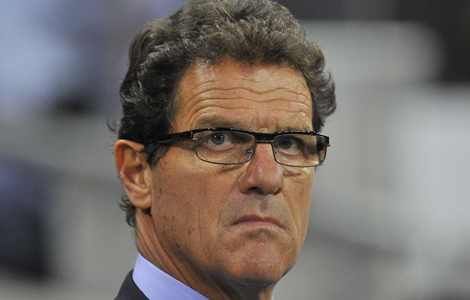China, EU seek stronger partnership amid Euro debt
Updated: 2012-02-16 11:13
(Xinhua)
|
|||||||||
BEIJING - China and the European Union (EU) have sent a clear message from their Beijing summit that they want to work together to address the European sovereign debt crisis.
Chinese President Hu Jintao praised the success of the summit on Wednesday, saying China expects enhanced political and strategic dialogues with the EU to properly address major concerns and sensitive issues, deepen cooperation and expand common ground, to boost progress of the bilateral all-round strategic partnership.
While meeting with European Council President Herman Van Rompuy and European Commission President Jose Manuel Barroso, Hu said China pays close attention to the measures taken by the International Monetary Fund and the European Central Bank in coping with the debt issue, and will enhance policy coordination with the EU and participate in global efforts to back Europe and the euro zone.
During the 14th China-EU summit held in Beijing on Tuesday, Chinese Premier Wen Jiabao agreed with Van Rompuy and Barroso that closer attention should be paid to dealing with the European debt crisis, and facilitating a two-way investment deal as soon as possible.
Leaders of China and the EU touched on a variety of bilateral and global issues in their summit, ranging from the debt crisis, trade and energy cooperation, to China's market economy status, as well as regional issues including the situation in Syria and Iran.
"China and the EU have their differences on some of the topics, thus face-to-face dialogues would help beef up mutual understanding, seek proper solutions to issues and further consolidate the China-EU comprehensive strategic partnership," said Qu Xing, head of the China Institute of International Studies.
Stronger trade links
Trade cooperation is an important component of China-EU ties. Currently, the EU is China's largest trading partner and biggest export market, while China is close to being the EU's biggest trading partner. Bilateral trade volume hit $567 billion in 2011.
President Hu on Wednesday voiced support for stronger China-EU cooperation in trade, investment and finance. He said China has always attached great importance to the EU's role in global affairs, and has been treating and developing relations with Europe from a strategic height and long-term point of view.
Premier Wen put forward five proposals on boosting China-EU trade bonds, including expanding mutual investment, promoting balanced two-way trade and cooperation in scientific research, innovation, energy and environmental protection, and boosting partnership in urbanization.
A joint press communique released from the summit says both sides agreed to launch negotiations on a two-way investment agreement as soon as possible, so as to "lay a legal foundation for the expansion of bilateral investment" and consolidate the confidence of investors.
From cooperation in energy, technology and environmental protection to protection of intellectual property rights and the fight against protectionism, detailed plans were nailed down for future cooperation.
The two sides also agreed to hold further discussions on energy strategies in a China-EU High Level Energy Meeting in June.
"The summit yielded rich outcomes in boosting bilateral trade, which not only cover concrete plans for deepening trade and investment, but also broaden potentials in fresh areas such as technology, energy and environmental protection," said Li Gang, a researcher at the Chinese Academy of International Trade and Economic Cooperation of the Ministry of Commerce.
China's bigger role in addressing European debt crisis
President Hu told Van Rompuy and Barroso on Wednesday China would join international efforts to back Europe and the eurozone, echoing Premier Wen's pledge of China's bigger part in resolving the European sovereign debt issue.
During the summit, Premier Wen expressed confidence in the euro and the European economy, adding China's willingness to support the EU in dealing with the debt issue is firm.
China is also considering more involvement in addressing the issue through the European Financial Stability Facility and the European Stability Mechanism, Wen added.
European leaders welcomed China's positive attitude. Van Rompuy said China's support helped the EU and eurozone restore confidence, and they look forward to further cooperation to strengthen the stability of the eurozone.
"Europe has a clearer understanding of China's role and expects China's greater help in dealing with the crisis. Chinese leader has sent a very positive message to this end," said Li Gang.
China has shown its companionship and, more importantly, sincerity in a time of crisis.
"The consensus between Chinese and European leaders on the debt issue would help boost confidence in the European market, and send a positive signal to the world in countering the crisis," said Chen Xin, an analyst for the Institute of European Studies at the Chinese Academy of Social Sciences.
Resolving MES in swift, comprehensive way
The issue as to recognition of China's full market economy status (MES) has long been a stumbling block to the development of China-EU relations.
Chinese and European leaders have agreed in their summit to work toward resolving the MES issue "in a swift and comprehensive way."
The agreement was, for the first time ever, listed in the joint press communique of a China-EU summit, with Van Rompuy saying there was "strong political will" on both sides to solve the issue.
Wen pledged that China would improve its laws and regulations in relation to foreign investment, enhance protection of intellectual property and improve its investment environment.
China has urged countries to recognize its full-market economy status as soon as possible and relax restrictions on high-tech commodity exports to the country.
"Along with the rise of China's position in the global economy and the rapid growth of China-EU cooperation, the European leaders are now taking a more active approach to addressing the issue," said Li Gang.
"The key step lies in the European side making a correct and wise political decision to grant China market economy status as soon as possible," he went on.
According to China's World Trade Organization Accession Protocol signed in Doha a decade ago, a 15-year transitional period has been imposed on China's market economy status. China will automatically get full market economy status by 2016.
The 14th China-EU summit had previously been set for last October, but was postponed as EU leaders scrambled to combat the Eurozone debt crisis.
The annual summit was initiated in 1998 as the top-level regular exchange mechanism between both sides.
Related Stories
The smart euro-debt strategy for China 2010-06-01 07:18
China offers help to tackle euro debt crisis 2010-12-22 15:31
Euro and debt 2012-01-31 07:58
Euro debt crisis 'creates opportunities' 2012-02-09 11:13
- Third-party auto insurance open to foreign firms
- Wen vows to speed up fiscal, financial reforms
- Alibaba seeks Yahoo CEO after talks: insider
- Experts: EU statement opens door to status
- China's FDI falls 0.3% in Jan
- Assembling ideas for Ikeas in China
- Investment 'will continue'
- PBOC sets 14% target for money supply growth rate









